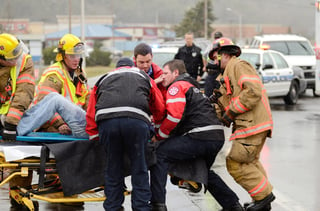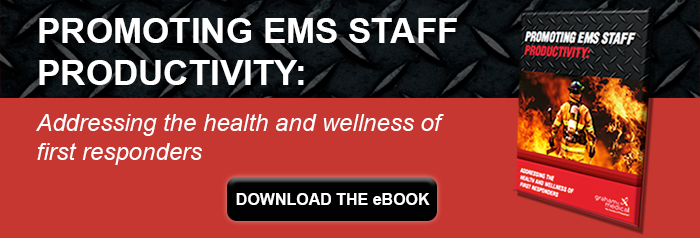 Fire suppression events generally occur in hazardous and stressful environments which often include flames, smoke, and falling debris. Rescue situations are often high-stress and rarely occur in ideal conditions. Emergency medical first responders are often subject to health issues and injuries on the job.
Fire suppression events generally occur in hazardous and stressful environments which often include flames, smoke, and falling debris. Rescue situations are often high-stress and rarely occur in ideal conditions. Emergency medical first responders are often subject to health issues and injuries on the job.
Here are some of the common ailments that affect these first responders.
Respiratory Disease
As this IAFF report indicates, it should come as no shock that firefighters are subject to an increased exposure to respiratory irritants and toxicants "including: sulfur dioxide, hydrogen chloride, phosgene, nitrogen oxides, aldehydes, and particulate. The combustion of building materials generates countless combustion products, with numerous new commercial compounds introduced annually.." Therefore, "it is essential that firefighters recognize the importance of breathing apparatus use, and take steps to minimize their risk of acute and chronic pulmonary disease."
The effectiveness of the breathing masks and the "healthy worker" syndrome have apparently masked the real risk and danger of respiratory disease among firefighters when compared to the general population.
Heart Disease
Smoke and stress can contribute to a heart attack or cardiac arrest. Heart attacks account for 45% of all work-related deaths among firefighters. This report goes on to say that "Lack of physical fitness, being overweight, and smoking make these risks higher."
Cancer
When old buildings burn, hazardous materials such as asbestos also become airborne. Fire smoke is especially toxic, and a contributing factor in cancer occurrence in firefighters. Mesothelioma is well-known cancer caused by toxin exposure, but lesser known issues are also common including cancers of the respiratory, urinary, and digestive systems.
Bloodborne Pathogens
Emergency medical responders are frequently exposed to blood borne diseases like Hepatitis B, Hepatitis C, HIV, and Meningitis. Current data suggests an exposure of 1 in every 2,500 emergency medical runs by the fire department.
Mental Health
High-stress jobs can lead to mental health issues such as anxiety, depression, and even PTSD. Witnessing trauma or being involved in an accident are additional triggers that can affect mental health. It is common for professionals to internalize these health issues in fear of being limited to the job, but this can lead to serious complications down the road, including suicide. The Firefighter Behavioral Health Alliance can assist EMS personnel who may be suffering from mental health issues.
Sleep Deprivation
Long shifts and intense emergency response can lead to irregular sleep patterns resulting in severe sleep deprivation. Sleep deprivation can cause injury both on and off the job. In addition, sleep deprivation can lead to mental health issues and even promote bad habits such as increased smoking.
Physical Injuries
68,085 firefighters were reported injured in 2015 (the most recent data year). The majority of these injuries consisted of sprains and strains. Medical responders often suffer from back injuries associated with patient transport resulting from overexertion, lifting at awkward angles and carrying patients through tight corners, stairs, and uncleared pathways.
The MegaMover® Transport Units by Graham Medical provide some of the most effective methods for injury prevention during patient transport. This 2014 FDIC article speaks to that point quite eloquently.
These are a few of several health risks associated with the EMS/fire protection profession. To learn about other occupational health risks and different ways to combat them, read our recent eBook, Promoting EMS Staff Productivity: Addressing the Health and Wellness of First Responders.
Contact us here for more information regarding our ems products.

